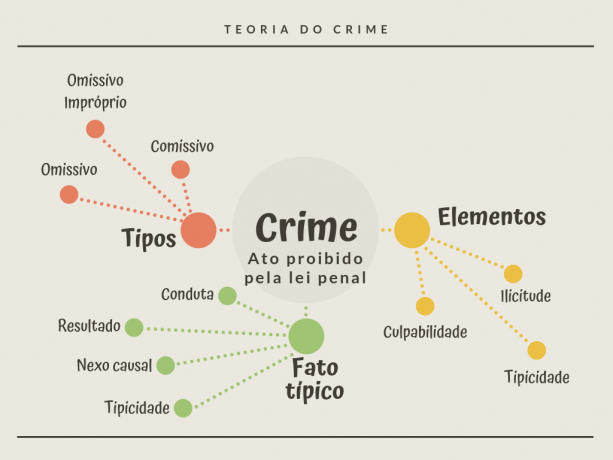THE crime theory it is a discipline of Criminal Law that covers several concepts, such as crime, typical fact, unlawfulness and culpability. Serves to check if a fact is framed as a crime provided for in criminal law.
Theory is, in short, the set of rules and requirements used to determine if the fact is a crime. It involves aspects related to the concept of crime and the attribution of a penalty for the attitude.
The theory is also known by the following names: General Theory of Crime and General Theory of Crime.
What is a crime?
Knowing what a crime is is the first important concept. crime is a act prohibited by criminal law, which has the determination of a penalty as a consequence, if it is practiced.
It is a fact that results in damage to a legal asset that is protected by criminal law.
For example: the crime of murder affects the legal asset "life", which is protected (protected) by law.
By definition of its elements, a crime will be any fact that is typical, illicit and culpable.
elements of crime
A crime is formed by three components: typicality, unlawfulness and culpability.
- Typicality: includes conduct, result, causal link and typicality.
- unlawfulness: may include characteristics such as excluding illegality, self-defense, state of need, strict fulfillment of a legal duty and regular exercise of a right.
- culpability: includes the concepts of liability (responsibility), demand for a different conduct and potential awareness of illegality.
Read more about the meaning of culpability and Imputability.
types of crimes
Crimes have their own classification, according to some characteristics. Look:
-
commission crimes: the commissive crime is defined by the practice of an action that the law considers criminal.
For example: assaulting a person during an argument (injury crime). -
omissive crimes: crime occurs when the individual fails to do an action that he or she should. In this case, it is the omission of conduct that characterizes the crime.
Example: failing to help an accident victim (crime of failure to help). -
Inappropriate omission crimes: the crime happens when the individual has an obligation to avoid a conduct (result) and does not do it.
For example: a person is responsible for the care of a child who, through his carelessness, has an accident.
To learn more about the different types and classifications, also read the meaning of Crime.
Crime and typical fact
The concepts of crime and typical fact are related, as the typical fact is considered the first element that characterizes a crime.
The typical fact is the indication that an act performed consists of conduct that the law considers to be criminal. It consists of four elements: conduct, result, causal link (causal relationship) and typicality.
THE conduct it is the behavior (action) performed by the person. Examples: assaulting someone, driving under the influence of alcohol (and taking the risk of causing a traffic accident).
O result it is the change caused by the action taken. For example: bodily injury caused to the injured person, death of a person by being run over.
O causal link it is the proof of the relationship between the act and the result. For example: in the aforementioned situations, the causal link is proof of the relationship between the aggression and the injuries caused or proof that the running over happened due to drunkenness to the steering wheel.
already the typicality it is the law's framework for practiced conduct. Example: the crime of bodily harm is determined in article 129 of the Penal Code (offending the bodily integrity or health of others). The crime of homicide while driving is framed in article 302 of the Brazilian Traffic Code (conducting manslaughter while driving a motor vehicle).
See more details about the elements of the typical fact and also see the meanings of Passional crime and liability crime.

